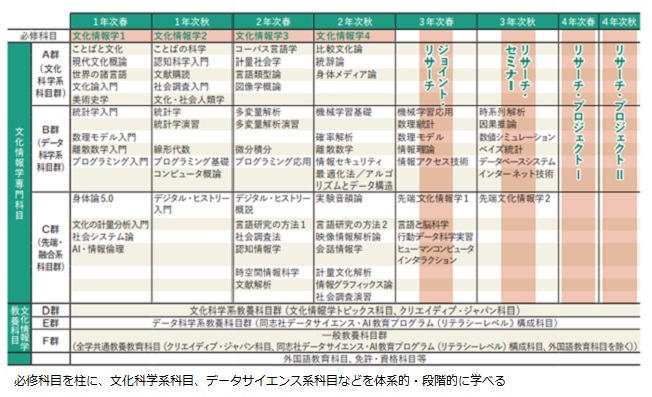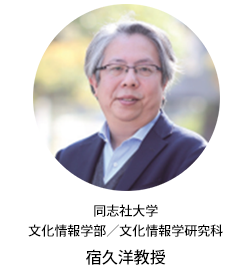With the advent of AI, the value of knowledge has changed
Redefining data science to learn
The term data science is permeating society, but its definition is actually vague.Furthermore, Professor Sukuhisa points out that the development of large-scale language models (LLM), which has attracted attention with ChatGPT, has greatly transformed the values of knowledge and skills that have been emphasized so far.
“Based on this background, we have redefined what data science education the Faculty of Culture and Information Studies is aiming for, and renewed the curriculum.
There are two main features of the new curriculum.
First, the pillars of data science education are defined as "mathematical science," "statistical science," and "computer science." andHalf of the students in the Faculty come from liberal arts and half from science, and their interests span a wide range of cultures, phenomena, and technologies.
Secondly, we set up compulsory subjects throughout the 1st to 4th grades, and created a curriculum structure that allows students to deepen inquiry-based learning step by step.Specifically, in the 1st and 2nd years, students acquire basic knowledge of cultural informatics and research literacy in cultural informatics 1-4. In the spring of the third year, students practice project-type group work by faculty members with different specialties in "Joint Research". After being assigned to a laboratory in the fall of the third year, the research theme is decided at the "Research Seminar", and in the "Research Project I / II" of the fourth year, graduation research is conducted as a culmination of inquiry-based learning.

Based on these compulsory subjects, we will provide a variety of specialized subjects such as "cultural science subjects", "data science subjects", and "advanced and interdisciplinary subjects" to deepen basic knowledge.In addition, "Cultural Science Subject Group" and "Data Science General Education Subject Group" are established to acquire the basic education related to cultural informatics.
In addition, the faculty sees students as members of a research institute rather than as users of a university, an educational institution, and positions the faculty as a "research institution-type educational institution" in which faculty members and students conduct joint research activities.It can be said that the philosophy of inquiry type and comprehensive knowledge creation type is also expressed in the fact that students are required to participate in society as GIVERs who bring benefits to society, not as TAKER who receive benefits from society.
Career development as a bearer of "information"
~Developers and high-level users~
It is said that there are two major career directions expected after studying at the Faculty of Culture and Information Studies.
"The first is a developer who has mastered data science techniques. After graduate school, they will advance to a professional career such as becoming a data scientist at a research and development position, an IT vendor, or a manufacturer. The second is to acquire knowledge of data science on their own. It is a high-level user who can be used in the work of.All companies are now paying attention to human resources who can take a bird's-eye view of things, analyze data, and apply it.Students of the Faculty of Culture and Information Studies are expected to learn about culture through data science. I hope that he will become a person who aims to acquire comprehensive knowledge through inquiry and become a person who will lead the human age,” says Professor Sukuhisa, who has high expectations.

- 1
- 2

